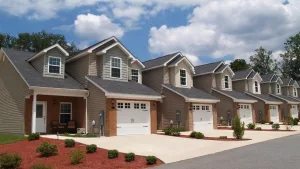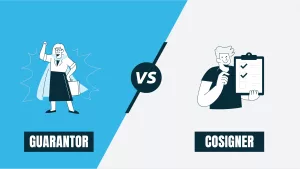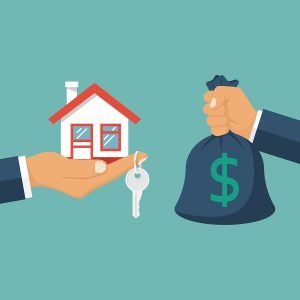Buy A Home With Low Down Payment in 2023
Go Back To Previous PageBuying a home may seem impossible for many because some can’t afford the down payment. That’s why most people start saving money first to ensure they can afford a down on a property. While this may be a good idea, you may find other better options. You can buy a home with a low down payment; some even allow a zero down. Check out the following to choose the best one to help you acquire a house with a low downpayment.
1. Veterans Affairs (V.A.) Loans
The Department of Veterans Affairs partially guarantees V.A. loans from mortgage finance companies, credit unions, banks, and other private lenders like Security America Mortgage. This type of loan has lower interest rates than traditional home loans. These loans also allow you to make a low or no down payment.
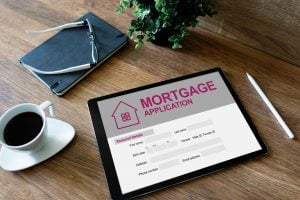
Online mortgage application on the screen. Property loan. Business and financial concept
Moreover, you don’t need private mortgage insurance (PMI) or a high credit score when availing of such loans. It also gives you a higher debt-to-income (DTI) ratio since it’s more flexible than others. The PMI protects the lender with PMI payments.
However, the property’s sale price must be lower than its appraised value to ensure zero down payment. The VA will pay the down payment if the form of reimbursement to the lender when the property is foreclosed, which is in agreement via the ‘V.A. home loan guaranty.’
In addition, you must be eligible to avail yourself of a V.A. loan. It would help if you were a reserve, member of the National Guard, active-duty service member, veteran, or the surviving spouse of a veteran. Then, secure a Certificate of Eligibility (COE) and other requirements to avail of this loan.
2. U.S. Department of Agriculture (USDA) Loans
Another loan that doesn’t have down payment requirements is the USDA loan. However, this requires a minimum of 620 credit scores, similar to the conventional loan program requirements. You can, however, use this loan only if you’re buying in a suitable location that’s not a densely-populated city. Think of the suburbs and small towns.
Thus, this loan is far from the common belief that it’s only for purchasing farmland. The USDA eligibility map is an excellent way to check if the location of the property you want to buy is eligible.
You also need to pay for a USDA guarantee fee which works as mortgage insurance, although you’re not required to have the latter. You’ll pay the recurring annual premium monthly aside from the up-front premium fee.
3. Federal Housing Administration (FHA) loans
This is the most common way to buy A Home With Low Down Payment.
Although the FHA loan requires a down, it’s as low as 3.5%. You can use this loan to buy condos or single-family properties within the FHA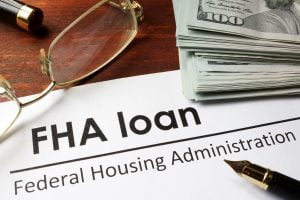 home limits. The property must also pass the standards that the U.S. Department of Housing and Urban Development has set.
home limits. The property must also pass the standards that the U.S. Department of Housing and Urban Development has set.
While the down payment is low, you must meet other requirements of the FHA-approved lenders. One is to have at least a 580 credit score. If you have a non-traditional credit history, the lender must check that you have an on-time rent payment for the past year. You must not have had any collection actions during this period and not more than one 30-day late payment.
Like USDA loans, you can use a financial gift from a third party toward a part of your down or all of it. However, you must prove that the money isn’t a third-party loan but a gift.
4. Conventional Mortgage loans (5% down)
You may need extra help qualifying for a loan if you’re a first-time homebuyer. This makes the conventional 97 loans more suitable for you, although they’re stricter than the Conventional regular loans. However, you may have to go for the conventional Mortgage if you can’t meet the Conventional 97 loan’s requirements.
It’s not as strict as the Conventional 97 loan but incredibly flexible, making it the most popular type. You can make a down as big as 20% or more and as low as 5% as long as you have at least 620 credit scores.
Another defining feature of this loan is its loan limits are higher than FHA loans. This means you may need to save up some more money to come up with a 5% down payment if you plan to buy a property that exceeds the FHA’s limit.
In addition, you also need to have private mortgage insurance (PMI) if you have less than a 20% down payment in conventional mortgages. Once you reach a 20% equity in the property, the PMI requirement can be canceled so that you won’t be stuck with such an additional fee for a long time.
5. How to buy a house with no money down or 0% LTV ratio
Sometimes the loan-to-value (LTV) can be as low as 0%.
Government-backed mortgages might be your most straightforward option if you want to purchase a house without any money down. The VA and USDA loan programs are two examples that allow for a $0 down payment. However, not everyone is eligible for these programs, as USDA loans have specific income requirements, and V.A. loans are only available to military buyers. Nevertheless, several other options are available for you to explore.
Typically, first-time homebuyers have to pay a minimum down payment of 3% to 3.5%, which is required for conventional or FHA loans, the most common type of Mortgage. Although zero-down loans are available, lenders generally target specific groups, such as veterans and rural home buyers with moderate or low income. Most buyers are more likely to qualify for a low-down-payment mortgage than a zero-down loan.
The good news is that every state provides home buyer assistance. These government grant programs can cover the down payment, so you don’t have to pay out of pocket. Remember that, as a buyer; you’ll also have to pay closing costs, which may amount to more than your down payment.
However, you can avoid paying these fees upfront by having them covered in various ways. Talk to your loan officer about options to reduce your out-of-pocket expenses.
6. Understanding A Zero-Down Payment Mortgage
A zero-down mortgage is a home loan that doesn’t require any initial payment. Typically, banks require a down payment when closing on a home loan, and banks determine the amount as a percentage of the purchase price. For instance, if you purchase a home for $200,000 with a 20% down payment, you’ll pay $40,000 at closing.
Lenders ask for a down payment to ensure you’re committed to your investment and less likely to default on your loan. However, for many home buyers, generating significant money can be challenging and take many years.
The only way to get a zero-down payment mortgage from major mortgage investors is through a government-backed loan insured by the federal government. This means the government and your lender will help pay your Mortgage if you cease repayment.
The government offers guaranteed loans to people who need financial assistance when buying a home. This means that government-backed loans are less risky for the lender, and the lender can expand their usual loan offerings to people with riskier financial profiles, such as borrowers with no down payment.
Did you know you can purchase a home without spending money? The V.A. and USDA offer government-sponsored loans with specific eligibility requirements for a zero-down mortgage. If you don’t qualify for one of these loans, don’t worry. You can still apply for an FHA loan or a conventional mortgage, which only requires a low down payment.
Conclusion
Buying a home requires sufficient funds for the down payment and other upfront fees. You can avail yourself of the loans mentioned above if you’re tight on budget. What’s important is to check your eligibility before applying for such a loan to avoid wasting time and money. The mortgage rates are likely higher whether you take a fixed or adjustable mortgage.
